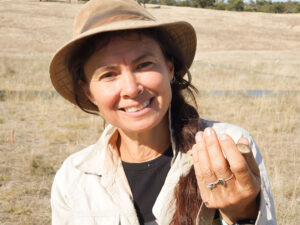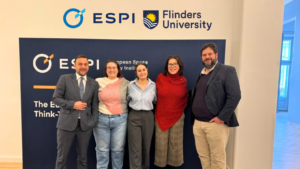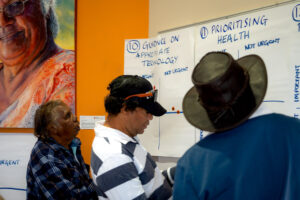

Funding to study translocated lizards
The Australian Academy of Science has announced that Ms Dee Trewartha from Flinders University is one of three early-career researchers awarded funding for ecology projects, thanks to the Margaret Middleton Fund for endangered Australian native vertebrate animals. The fund provides grants to support emerging researchers who are conducting conservation-based research of Australian ecosystems that ultimately will lead to tangible outcomes for endangered native vertebrates.
Ms Trewartha was awarded for her project Heat, water and lizards – understanding behavioural responses to translocation in an endangered, endemic Australian grassland reptile to inform conservation practices. The pygmy blue-tongue lizard is endemic to South Australia and only found in a small number of isolated locations. This is an endangered species, at a high-risk of extinction due to dwindling grasslands. One way to conserve populations of these lizards may be to move them to protected locations (known as translocation).
Ms Trewartha will use time-lapse cameras to monitor different populations of translocated pygmy blue tongue lizards and assess the population differences in their thermoregulation after translocation. “Understanding the ability of high-risk populations to persist in altered climatic conditions is vital for successful translocation and therefore for ongoing management decisions,” says Ms Trewartha. “I am absolutely excited that our little pygmy blue tongues have been funded by this prestigious award and I hope it will raise people’s awareness of the existence and conservation needs of this endangered endemic lizard.”
Furthering space policy studies in Vienna

The European Space Policy Institute (ESPI) has welcomed three students from Flinders University for a two-month traineeship at its new premises in Vienna. The traineeship – jointly launched by ESPI and Flinders University as part of a broader collaboration between the two institutions – allows Flinders University students enrolled in the Outer Space Governance elective course to spend 8-12 weeks at ESPI’s office in Vienna and receive training on space policy matters, space law and space governance.
The students completing their traineeship at ESPI are Ellen Feeney, Eloise Clarke, and Sailor Tyler, who will engage in research activities related to a joint ESPI-Flinders University study on emerging security and defence issues in space.
The collaboration between ESPI, the Space Power and Policy Applied Research Consortium (SPPARC), and the Jeff Bleich Centre of Flinders University was launched in early 2023 upon the signing of a Memorandum of Understanding to allow for the conduct of joint studies on matters of common interest, research visits by experts from ESPI and Flinders University, and engagement activities including conferences and workshops both in Europe and in Australia.
Key report to improve water quality for remote Indigenous communities

Flinders’ Professor Kirstin Ross and Professor Nancy Cromar are co-authors of a major new report for the Goyder Institute for Water Research – “Working together for better drinking water in the bush: A report summarising the outcomes of a forum held in Mparntwe (Alice Springs) 27-29 June 2023” – which will guide the allocation of $150m in federal assistance to improve water quality in remote Indigenous communities.
The forum was funded by the Department of Climate Change, Energy, the Environment and Water (DCCEEW), which is responsible for Australian Government investment in nationally important water infrastructure through the National Water Grid Fund, achieved in partnership with state and territory governments. In February 2023 the Government committed $150 million within the fund towards projects that can deliver safe and reliable water in remote and regional Aboriginal and Torres Strait Islander communities. For more information visit www.nationalwatergrid.gov.au/first-nations-water.
The report is a culmination of the collaborative efforts and insights shared at the forum, which identified twelve pivotal actions critical to advancing the provision of safe and reliable drinking water in remote Aboriginal and Torres Strait Islander communities.
Dr Alec Rolston, Director of the Goyder Institute for Water Research said “Building on work that has gone before, this report describes the challenges faced daily by First Nations remote and regional communities in securing clean and safe drinking water. Through bringing diverse people and organisations together from across Australia, we worked together to identify solutions for these challenges and priority actions needed to address ongoing issues faced by people living in remote communities.”
The top five actions identified by the forum participants were: Developing national principles on safe drinking water for remote communities; Prioritising health by addressing national health targets; Creating a local First Nations Water Authority with First Nations voices to provide expertise on water in remote communities; Undertaking a coordinated community education program to increase awareness and understanding of remote drinking water issues; Providing guidance on appropriate drinking water technologies and their suitability for remote communities.
The actions described in the report will contribute significantly to enhancing quality of life for Aboriginal and Torres Strait Islander remote and regional communities.

